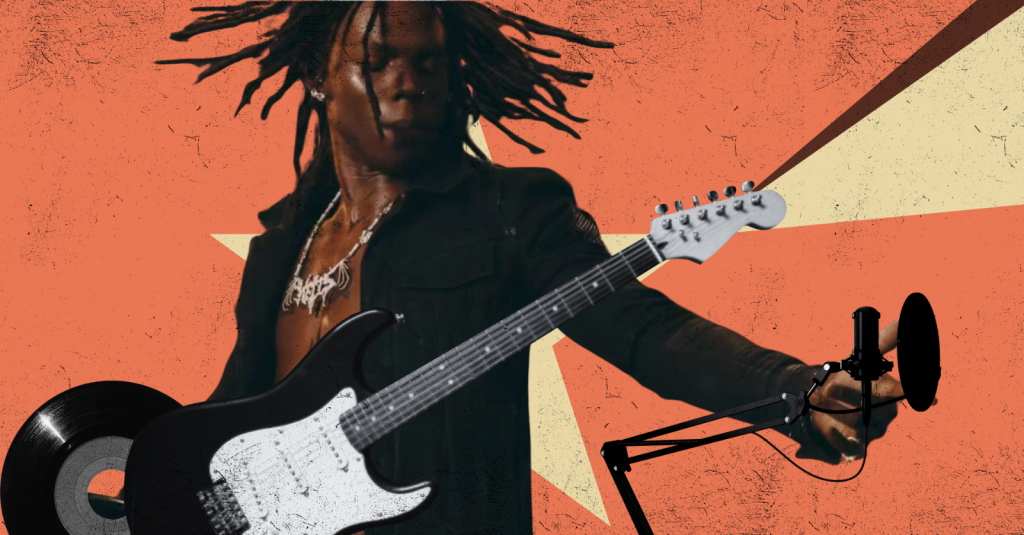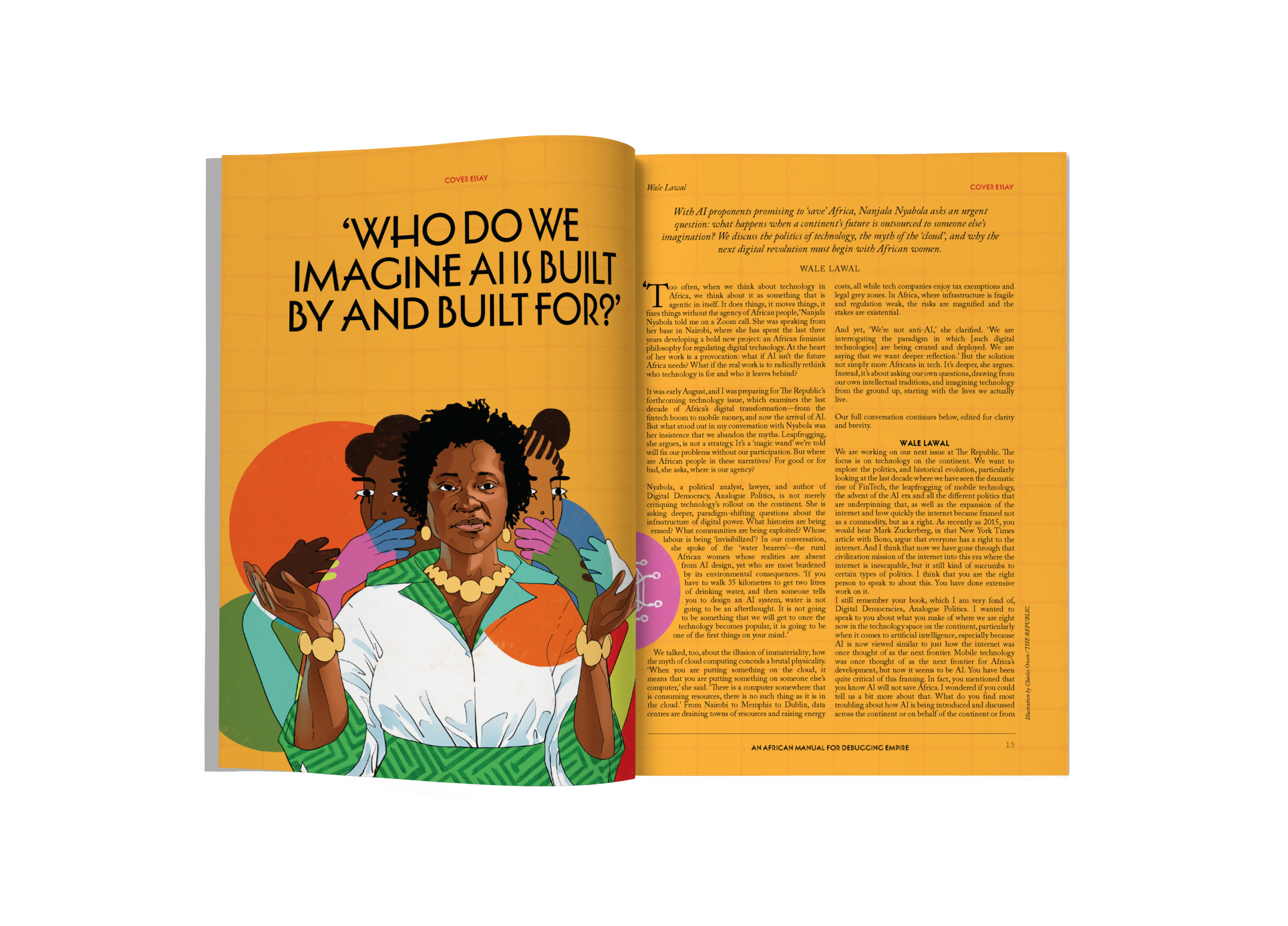
Photo Illustration by Ezinne Osueke / THE REPUBLIC. Source Ref: WIKIMEDIA.
THE MINISTRY OF ARTS / MUSIC DEPT.
Rema Wants a Seat at the ‘Big Three’ Table—Has He Earned It?

Photo Illustration by Ezinne Osueke / THE REPUBLIC. Source Ref: WIKIMEDIA.
THE MINISTRY OF ARTS / MUSIC DEPT.
Rema Wants a Seat at the ‘Big Three’ Table—Has He Earned It?
Another banga’ is an audacious introduction; often heard at the start of Rema’s songs. The phrase is a clear indication that Rema is acutely aware of his immense star quality and ability to create explosive songs on a consistent basis. Rema’s elocution of these words is important—his pidgin dialect changes the word ‘banger’ to ‘banga’, and this instantly alerts the listener to Rema’s Nigerian origin. Songs such as ‘Woman’, ‘Bounce’, ‘DND’, ‘OZEBA’, and ‘MARCH AM’ have an adrenaline inducing quality, akin to the feeling of throwing tiny ‘banger’ fireworks unto the ground and waiting for them to shoot into the air.
These fast-paced songs are not a constant for Rema, as he shapeshifts frequently through his music. Rema often blends genres in insightful and experimental ways, as heard on ‘Red Potion’, which has elements of Fela-inspired Afrobeat and polyrhythmic drums towards the end which elevate the song seamlessly. There are also soft moments within Rema’s discography, as heard on his R&B inspired single, ‘Is it a Crime’ and reflective moments captured by the introspective lyricism on ‘NOW I KNOW’, where Rema sings about the trust issues that come with handling fame and success.
Against this backdrop, Rema’s lyrics on ‘HEHEHE’, where he confidently notes that there is ‘no [longer a] big three, there’s now a big four’, should not come as much of a surprise, particularly because Rema adopts a larger than life, braggadocious persona on his latest album, HEIS, which was released in July 2024. The reference to ‘haters talking…while he’s making money’ and calling himself the ‘Afrobeats prince’ on the song ‘HEIS’, are clear indications that Rema is embracing his self-proclaimed spot as the fourth member of Afrobeats royalty. Although Rema’s visual and sonic versatility, consistency in delivering great-quality music, confidence and refusal to follow Afrobeats trends make him a strong contender, these qualities alone may not firmly secure his ‘big four’ position within the current Afrobeats climate.
WHAT DOES IT TAKE TO SECURE A ‘BIG 4’ POSITION WITHIN AFROBEATS?
In 2019, Rema had just signed to Jonzing World (a subsidiary of Mavin Records) and his song, ‘Dumebi’, was his initial introduction to a mainstream Afrobeats audience. The song’s popularity earned Rema the ‘Next Rated Artist’ award at the 2019 Headies Award and his career has had an upward trajectory ever since. Rema has cultivated a loyal fanbase called ravers and pushed himself past the confines of Afrobeats due to his unique blend of the genre with contrasting musical and visual elements, such as the rockstar aesthetic which heavily influences his RAVAGE EP (2023) and HEIS album (2024). However, Rema’s stardom is still relatively new, particularly when it is contrasted against the ‘big three’ artists: Burna boy, Davido and Wizkid, as well as other Afrobeats acts like Tiwa Savage and Wande Coal, who have been cultivating loyal Afrobeats fanbases for over a decade.
In 2018, Burna Boy released ‘Ye’, which exposed him to an international audience because Kanye West’s album title of the same name unintentionally boosted Burna Boy’s streams on Spotify and Apple Music. Davido had numerous hit songs under his belt including the songs ‘If’, ‘Fia’ and ‘Like Dat’, which were released within short-time frames of each other during 2017. By 2014, Wizkid had released ‘Ojuelegba’ which changed the trajectory of his career. As noted by Patrick Ezema in his article ‘How “Ojuelegba” Took Wizkid to the Word’: ‘[The] success [of Wizkid’s Ojuelegba song] not only reshaped the limits of what was possible, commercially and in reach, with Nigerian music, it gave a blueprint to achieve it, sidestepping the vain recipe for cross-cultural travel that executives were using (and failing with) to push Nigerian music internationally.’ In comparison to Rema who was at the start of his career, the ‘big three’ had cemented their places as Afrobeats’ biggest stars by 2019. This presents experience and longevity as Rema’s Achilles heel and potential barrier to entry where the ‘big four’ position is concerned.
shop the republic
Rema argued against this view in his Breakfast Club interview on 13 September 2024, by acknowledging that ‘…[people] want to give you your respect when you are ten years in the game and my career did not play according to those rules. I was already breaking records [very early on].’ In the same interview, Rema reiterates that he is deserving of the ‘big four’ position, not solely because he makes hit songs, but more importantly due to the huge impact he has made on Afrobeats within a short amount of time.
Although longevity and experience are important, they can often be viewed as arbitrary indicators which stifle talented younger artists and prevent them from gaining the status, recognition and ‘flowers’ they deserve. While a fourth position on the ‘Afrobeats Mount Rushmore’ is a contentious spot, Rema has considerable claim to it. His relatively broader global exposure—especially compared to other Afrobeats artists often excluded from the ‘big three’ or ‘big four’ conversations despite their local success—is arguably a significant reason why. Within six years, Rema’s ‘Calm Down’ became the first song led by an African artist to amass a billion streams on Spotify, thanks to the ‘Calm Down’ remix featuring Selena Gomez. Additionally, songs like ‘Iron Man’ infuse melodies which are reminiscent of the high pitched, hypnotic vocals adopted by Bollywood singers and this has led to Rema’s widespread fanbase in India.
Despite his international success, Rema has not isolated or abandoned his core Afrobeats fanbase. While Western validation and exposure are great economic markers of growth, they are not sustainable indicators for determining authentic and undiluted Afrobeats. Rema’s HEIS album demonstrates his keen awareness of this, as his hometown of Benin is presented as the cultural focus of the album. This is emphasized through the song ‘BENIN BOYS’, featuring Shallipopi, and the infusion of Edo words in ‘OZEBA’, which means ‘trouble’ or ‘problem’. Prior to HEIS, Rema honoured his Edo heritage through his visual identity, music videos and live performances which incorporated images and symbols of bats. In 2021, Rema explained the following on X: ‘In Benin city, when you look up the sky in the evening all you see is bats flying and that’s why it’s my signature emoji, a constant reminder of where I’m from.’ On HEIS, Rema not only honours Benin through his visual identity, branding and live performance set designs; but equally through the language, location and culture that informs the musical landscape on HEIS.
shop the republic
REMA’S CONSTANT REINVENTION AND VERSATILITY
Rema’s willingness to experiment and re-invent himself with each musical project is arguably one of his strongest and most engaging qualities as an artist. The dark, gothic visual identity surrounding HEIS is a far cry from the bright, warm and youthful colours that shaped the Rave & Roses (2022) aesthetic or the red, fiery imagery which accompanied his Ravage EP.
Beyond this, Rema’s musical universe is rich with an extensive catalogue of influences ranging from early 2000s Afrobeats, Bollywood inspired melodies, rock, R&B, trap, lo-fi and pop. A large musical palette has made it possible for Rema to sidestep trends to create distinct and memorable musical moments. For instance, the recent Afrobeats trend of mixing Amapiano and Afrobeats is not something Rema participated in. This fusion of genres was championed by major mainstream Afrobeats artists including Davido (through ‘Unavailable’), as well as Asake and Olamide (through ‘Amapiano’), and by default, other artists began to incorporate this sound to create a uniformity within Afrobeats that Rema rejected on Rave & Roses and Ravage EP, which were both released at the peak of the ‘Naijapiano’ frenzy. Rema’s dedication to focusing on a personal musical lane or journey, which often deviates from trends in Afrobeats, while still maintaining commercial success and exposure is significant. Through this lens, Rema’s claim to ‘big four’ status may be contentious, but it holds weight and can hardly be viewed as a fabricated insistence on premature accolades or respect within Afrobeats.
shop the republic
-
‘The Empire Hacks Back’ by Olalekan Jeyifous by Olalekan Jeyifous
₦70,000.00 – ₦75,000.00Price range: ₦70,000.00 through ₦75,000.00 This product has multiple variants. The options may be chosen on the product page -
‘Make the World Burn Again’ by Edel Rodriguez by Edel Rodriguez
₦70,000.00 – ₦75,000.00Price range: ₦70,000.00 through ₦75,000.00 This product has multiple variants. The options may be chosen on the product page -
‘Nigerian Theatre’ Print by Shalom Ojo
₦150,000.00 -
‘Natural Synthesis’ Print by Diana Ejaita
₦70,000.00 – ₦75,000.00Price range: ₦70,000.00 through ₦75,000.00 This product has multiple variants. The options may be chosen on the product page
shop the republic
Rema’s versatile discography and relatively fast commercial success indicates that he is an outlier that has achieved mainstream international and local recognition, cultivated a loyal and dedicated fanbase and created consistently distinct and memorable Afrobeats music within six years and counting. However, Rema’s success does not translate to an automatic or undisputed ‘big four’ position, particularly if we look beyond markers such as international recognition or commercial success. Although longevity (or a lack thereof) should not necessarily deter an artist from gaining elevated recognition, it cannot be ignored entirely when considering how newer artists co-exist alongside older acts that paved the way for a younger generation of Afrobeats stars like Rema. Artists such as Tiwa Savage and Wande Coal have been creating great quality Afrobeats music for much longer than Rema has, yet they are often left out of the ‘big three’ ranking. Would it be fair to grant Rema access to a spot that these artists have been denied access to for years? There is an air of permanence which surrounds the traditional ‘big three’ ranking, as it places Burna Boy, Davido and Wizkid on an unshakeable pedestal, even when these artists might not have deserved it due to a lukewarm album or lacklustre single. Expanding the ‘big three’ position does not change this issue or correct it, instead it places artists on a ranking that might ultimately be their own creative undoing because they no longer feel challenged to maintain a position that is granted to them every year; without little to no pushback from their fans or the Nigerian music industry.
Instead of creating longer lists or new ranking orders, the ‘big three’ or ‘big four’ positions should be treated like relics from the early to mid-2000s—when Afrobeats had clearer demarcations that separated its largest artists from their peers. Over time, these lines have become immensely blurred with artists like Tems, Ayra Starr and Asake arguably rivalling Rema’s Nigerian and international fanbase. Rema’s experimentation and commitment to taking musical risks may give him a distinct advantage over these artists, but in today’s volatile Afrobeats landscape, placing an artist at the top does not necessarily mean their position is fixed and untouchable⎈
BUY THE MAGAZINE AND/OR THE COVER
-
‘The Empire Hacks Back’ by Olalekan Jeyifous by Olalekan Jeyifous
₦70,000.00 – ₦75,000.00Price range: ₦70,000.00 through ₦75,000.00 This product has multiple variants. The options may be chosen on the product page -
The Republic V9, N3 An African Manual for Debugging Empire
₦40,000.00
US$49.99
















